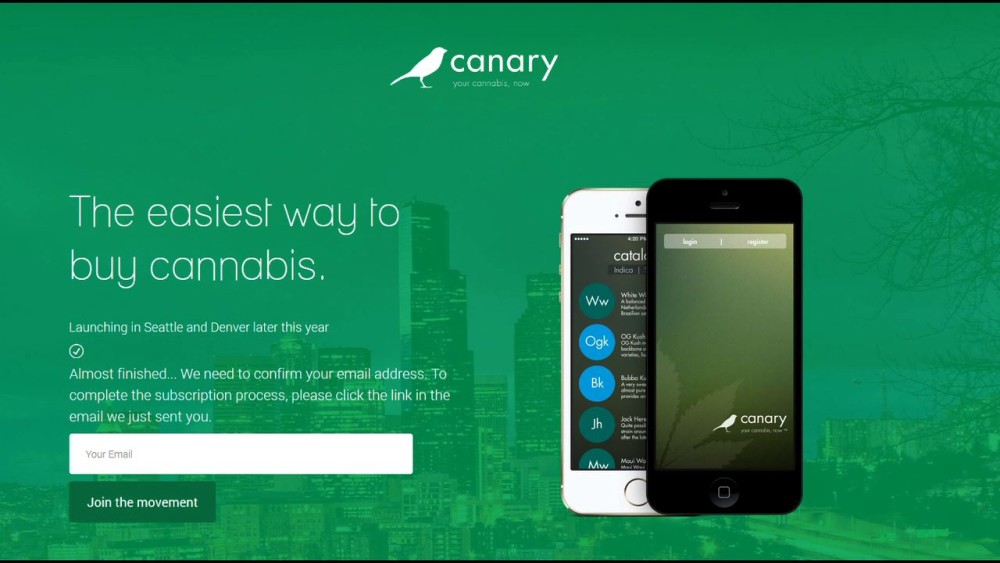By Evan Bush
The Seattle Times.
Exactly a month after Seattle Mayor Ed Murray’s office announced it would begin cracking down on marijuana deliveries, three young entrepreneurs at the University of Washington plan to launch a business to streamline them.
Canary, touted as the Uber of marijuana, is launching Saturday. With a few swipes on their smartphones, medical-marijuana patients can order pot products delivered from local dispensaries.
The company presents a challenge for the mayor’s office that officiated a contentious deal with the original Uber and now faces a burgeoning for-profit medical-marijuana industry that City Attorney Pete Holmes says is not legal.
So far, the administration hasn’t made up its mind on Canary.
“This is a new wrinkle in a complex problem,” said Jason Kelly, a spokesman for Mayor Ed Murray. “The mayor’s office is aware of this new innovation and is taking a look at it, but has not determined yet how to respond.”
Here’s how Canary works: Businesses pay the company an upfront fee of $500. Canary takes product photos and creates a digital storefront accessible to users through a mobile app.
Medical-marijuana patients, meanwhile, upload their IDs, patient authorizations and collective-garden agreements to Canary. Once their paperwork is verified, they can order.
Third-party couriers, who are medical-marijuana patients themselves, deliver the pot. Canary takes a “percentage of sales driven through the app,” said Josiah Tullis, 20, one if the company’s co-founders.
The students, who have been working on the self-financed app from a small office in the UW’s business school, hope Canary could be a model for regulation of recreational delivery.
So is it legal? Or, perhaps a better question, will the city prevent them from operating?
Delivery is banned by Initiative 502, which legalized recreational marijuana. The state’s medical-marijuana law merely provides a defense in court for selling pot.
Tullis said the company doesn’t sell or deliver pot itself, but is positioned “entirely as a tech and logistics company.” He said that insulates the company from any risk.
“We do fleet management, digital marketing,” said Tullis. “Sort of ancillary services for dispensaries that want to deliver.”
The couriers, Tullis said, are independent businesses.
John Strait, an associate professor at Seattle University’s law school, said the idea that contractors shield Canary from risk is “highly questionable and problematic.” He said prosecutors could view Canary’s actions as aiding and abetting or conspiracy.
“The key will be whether they profit from the independent contractor’s decision to break the law,” Strait said.
Dan Donohoe, a spokesman for the King County Prosecutor’s office, said it has not received any cases against marijuana-delivery services and it would be difficult to speculate about how the office would handle that type of case.
In Seattle, delivery services with bolder business models have thrived.
Evan Cox helped found Winterlife, perhaps the most prominent recreational-pot-delivery company in Seattle. Cox said his company made more than 70,000 deliveries in less than year. He left the delivery business shortly after recreational stores launched, was never prosecuted and made enough money to fund his foray into legal marijuana as a pot processor in the recreational system.
“Once (502 stores) started opening up, we decided to close down and look long term,” said Cox. “It was really tough because it was amazingly profitable.”
It’s not clear how many delivery services are operating in Seattle. Despite the city’s vow to shut them all down, Tullis believes Canary will be low on the city’s list of concerns.
“The crackdown, from what I can tell, is a little vague,” said Tullis. “It appears to be targeting just the recreational-delivery services, and as a second priority, those that feign being medical but don’t verify users.”
Alexander Lopera owns Heaven Bound, one of seven dispensaries that just finished a one-month trial with Canary, before the service was widely available.
He said the city’s concerns about delivery are valid, but those serving real patients shouldn’t be the target.
“All of a sudden overnight, a bunch of delivery companies popped up. They were advertising to tourists: ‘No medical cards needed,’?” Lopera said. “That’s not what Heaven Bound is about and that’s not what Canary is about. We only work with patients.”
Whether that argument convinces the city remains to be seen. Like Uber, Canary fills a niche before the legal framework exists to support it.
That could change: State Sen. Jeanne Kohl-Welles, D-Seattle, plans to propose a bill that would, among other changes, legalize and regulate marijuana delivery under the Initiative 502 structure.
Until then, Canary launches into the unknown.
“The problem is, the industry and the environment is so tumultuous. It’s changing overnight,” Cox said.














































































































































































































































































































































































